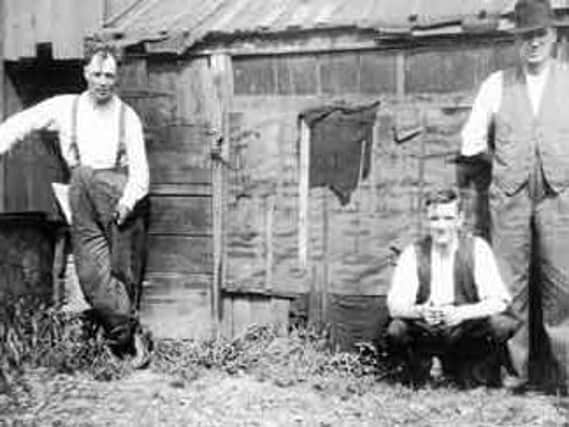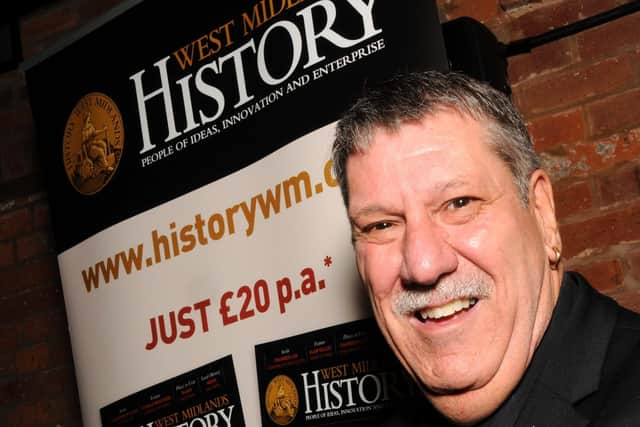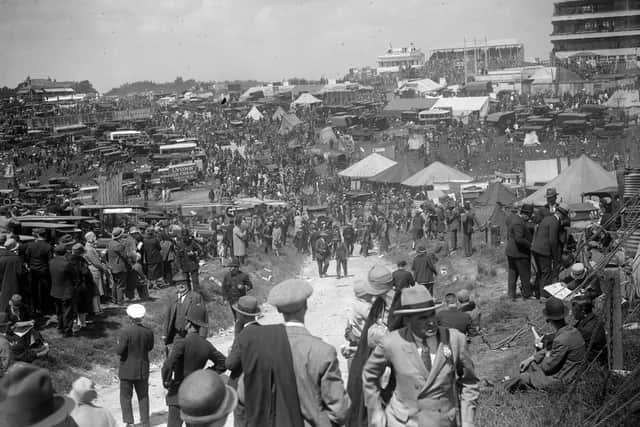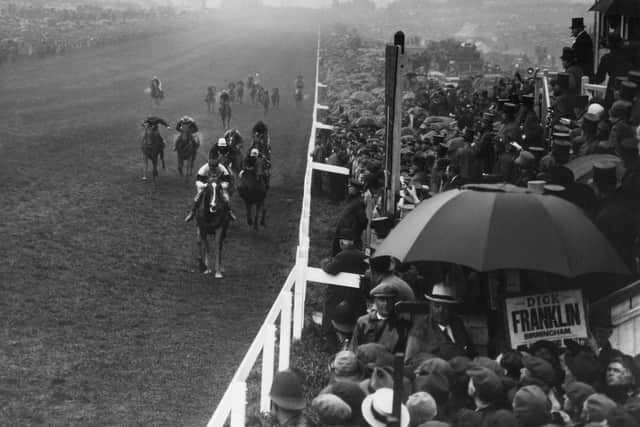Great-grandson of real Peaky Blinder investigates notorious Yorkshire gangs of the 1920s


Peaky Blinders has become an unexpected international sensation reaching millions of viewers around the world through the BBC and Netflix, with Cillian Murphy winning cult status as dapper anti-hero Tommy Shelby. But although some of the characters in the show about gangsters in Birmingham in the early 20th century are based on real-life people (not including the fictional Shelby), author Carl Chinn knows from his own family history that the reality was altogether less romantic than the corrupt chivalry it portrays.
Chinn’s great-grandfather Edward Derrick was a Peaky Blinder himself but is not an ancestor he looks back with pride on.
Advertisement
Hide AdAdvertisement
Hide Ad“I didn’t know him but I knew of him growing up and that he was a violent man who would beat up my great-grandmother,” says Chinn, whose new book Peaky Blinders: The Legacy reveals the true stories of Britain’s notorious 1920s gangs, including some who operated in Yorkshire. “My great-grandmother divorced him and I found the divorce papers in the National Archives. It was granted under the Poor Persons Act. She couldn’t read or write but in legal language there was the description of how violent he had been towards her.”


The latest book is the 34th written by the 64-year-old social historian and is a sequel to last year’s bestselling Peaky Blinders: The Real Story.
It widens the story out beyond the growth of Birmingham’s Peaky Blinders gangsters – so named because they would stitch razor blades to the inside of their flat caps – to examine how street gangs across the country in the 1920s fought for control over illegal gambling and the blackmailing of bookmakers at racecourses, which were the only places where betting was permitted by law at the time.
Chinn says his intention with the meticulously-researched book is to present the true picture of what occurred and tell the stories of some of the innocent people unfortunate enough to get caught up in the crossfire between the rival criminals.
Advertisement
Hide AdAdvertisement
Hide Ad“The TV series has been brilliant for Birmingham, it has got to be praised,” he says. “Who would have ever thought Cillian Murphy could make the Brummie accent sound sexy? But as a historian watching it, you are aware the reality is very different. You have to suspend your historical knowledge in many respects.


“It is really important to bear in mind there are realities behind the drama. Gangsters are not men of honour or generous or anti-heroes. They were vicious, violent men.
“That is the key difference between what happened and the dramatised versions of history, particularly when you are talking about gangsters and the Mafia.”
That point is illustrated in the book’s chapter on the Sheffield Gang War, fought between the Mooney Gang, led by George Mooney, and the Park Brigade headed by Sam Garvin.
Advertisement
Hide AdAdvertisement
Hide AdUnlike other conflicts of the era, this was fought not over racecourse protection rackets but control of a lucrative gambling site at Sky Edge overlooking Sheffield city centre. It was an area of wasteland where men would gather to bet on the tossing of coins and the violence became so extreme that at one point Sheffield was dubbed the ‘little Chicago of Britain’ in reference to the American city where Al Capone held sway.


The book recounts the murder of First World War veteran William Plommer. He was a hard-working family man who was beaten to death in the street by members of Sam Garvin’s gang in 1925 after intervening in a pub fight involving one of their members the night before.
The killing shocked Sheffield and an estimated 20,000 people lined the streets on the day of Plommer’s funeral to pay their respects. After 11 men were initially arrested, five were ultimately convicted over the killing, with two brothers, Lawrence and Wilfred Fowler, hanged for murder.
Chinn says: “It is people like Walter Plommer who get caught in the crossfire. He was the antithesis of Garvin and Mooney, he was a good family man and a well-respected man. He could have taken them all one at a time but they attacked him together.
Advertisement
Hide AdAdvertisement
Hide Ad“I hope readers take away the fact that gangsterism is something deplorable.”
Chinn says the unfortunate reality is that gang culture is still very much in existence in cities like Sheffield and Birmingham today.
“Drugs is a major problem and a lot of young people look around and see who in their neighbourhood has got the money and got the car and it is the gangsters,” he says. “A lot get that feeling of belonging from it. We need to draw out what is positive that young men get from a gang and draw that away from the things that aren’t good.”
As well as the Sheffield Gang War, the book reflects on the Mexborough Boys and in particular the last major race-gang battle at Yarmouth in 1926.
Advertisement
Hide AdAdvertisement
Hide AdIt also examines a brutal attack on a party of bookmakers from Leeds in 1921 at Epsom which led to the imprisonment of 17 members of the so-called Birmingham Gang led by Billy Kimber – one of the real-life gangsters who is portrayed in the Peaky Blinders series.
The book recounts how the bookmakers had been regarded as allies as the Birmingham Gang but switched allegiances to London underworld boss Charles Sabini and were targeted for punishment as a result.
“Involving a large number of attackers, it was well planned and was a bloody warning to bookmakers what would happen if they deserted the Birmingham Gang,” the book explains. “And as the victims were mostly Jewish, it was also an opportunity for venomous anti-Semitism.
“It attracted widespread condemnation in the press; it energised the police against the gang; and it resulted in the imprisonment of 17 of the most menacing of the Birmingham Gang.”
Advertisement
Hide AdAdvertisement
Hide AdChinn says one of the challenges of writing the book was separating fact from fiction as there could often be wildly differing accounts of the same event.
“With regards to the newspapers of the time, it is about getting a few different accounts of the same event and finding out what they have in common in the reporting. Compared to the first book last year where the reporting was ‘this happened, ‘that happened’, by the 1920s the newspapers were quoting these men directly.”
In addition to going through old newspaper reports and checking out police reports in the National Archives, he also went back to interviews he had conducted over 30 years ago for one of his earliest books, Better Betting with a Decent Feller, which focused on the history of the illegal gambling industry.
People he spoke to for that book had lived through the time in question and witnessed it first-hand, with those he spoke to including the younger brother of Alfie Solomon, whose fictionalised character Alfie Solomons is played by Tom Hardy in Peaky Blinders.
Advertisement
Hide AdAdvertisement
Hide Ad“I had heard of the racecourse wars before that but didn’t really know much about them until I interviewed all these old bookmakers.”
Chinn’s own family history makes him an expert on illegal bookmaking – both his grandfather and his father were involved in the trade, which was commonplace in working-class communities across the country until betting shops were finally legalised in 1961.
He says for decades, the policing of underground betting shops were near-farcical, with stooges hired to pretend they were running shops to prevent repeat fines for the true owners building up and some police officers tipping bookies off about when a raid would take place.
“It became a piece of street theatre. It was legalised in 1961 when it became increasingly obvious the law was broken. The ludicrousness of English law was such that you had to have been nicked as an illegal bookie to get a legal pitch.”
Advertisement
Hide AdAdvertisement
Hide AdChinn started working in the family business when he was a teenager but his father sold it in 1984 as he didn’t want his son to follow him into the trade.
“I loved the betting shops and the camaraderie - part of my love of history came from talking to the older punters and hearing their stories,” he says. "They would only have a small bet and would not be spending a lot of money. Part of the day was to have a chat and I learnt so much about Sparkbrook, about my own family and also working-class life.”
Chinn, who went on to become a university professor and was awarded an MBE for services to local history and charities, says he often reflects how differently his life may have turned out if he been born a generation or two earlier.
“Both of my parents were from very tough working-class districts but we grew up well-off. Mum and Dad drilled into me you respect your background and don’t turn your back on where you come from. I was the first member of the family to go to grammar school and university. I know how lucky I was.
Advertisement
Hide AdAdvertisement
Hide Ad“My life would have been different if I had been born before the Second World War - I probably would have been an illegal bookmaker.”
He says his family would be shocked by the prevalence of 24-hour online gambling which stands in stark contrast to the days of people pushing wrapped-up slips of paper with their bets on through the letter box.
“They would have been appalled. Now there are no restrictions at all. When it became legal, we couldn’t open after 6.30pm and windows had to be blacked out. It is too easy to lose your life now. With most of the back-street bookies there was a sense of belonging and social responsibility. My grandad and dad’s position was they wanted the pocket money of the customer, they didn’t want the housekeeping money.”
Author's family link to Yorkshire
Carl Chinn says he feels an affinity with Yorkshire, particularly as his wife was born in the county.
Advertisement
Hide AdAdvertisement
Hide Ad“Although my wife Kay is Irish she was born in Bolton on Dearne and christened in Goldthorpe,” he says. “Kay’s maternal uncle, Des Farrell, had left Dublin as a 16-year-old to work down the pit, after a recruitment campaign in Ireland.
“After training in Nottinghamshire, he was moved to a hostel in Mexborough and later settled in Bolton on Dearne.
“Kay’s mother and father, Agnes and Michael, moved there in 1955 when their oldest daughter was a baby. They were home sick and moved back to Dublin when Kay was four. But they made close friends in South Yorkshire and stayed in touch with them for the rest of their lives.”
Support The Yorkshire Post and become a subscriber today.
Your subscription will help us to continue to bring quality news to the people of Yorkshire. In return, you'll see fewer ads on site, get free access to our app and receive exclusive members-only offers.
Advertisement
Hide AdAdvertisement
Hide AdSo, please - if you can - pay for our work. Just £5 per month is the starting point. If you think that which we are trying to achieve is worth more, you can pay us what you think we are worth. By doing so, you will be investing in something that is becoming increasingly rare. Independent journalism that cares less about right and left and more about right and wrong. Journalism you can trust.
Thank you
James Mitchinson